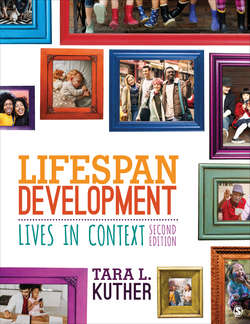Читать книгу Lifespan Development - Tara L. Kuther - Страница 62
На сайте Литреса книга снята с продажи.
Erikson’s Psychosocial Theory
ОглавлениеErik Erikson (1902–1994) was influenced by Freud, but he placed less emphasis on unconscious motivators of development and instead focused on the role of the social world, society, and culture. Erikson posed a lifespan theory of development, as shown in Table 1.3. According to this theory, individuals progress through eight psychosocial stages that include changes in how they understand and interact with others, as well as changes in how they understand themselves and their roles as members of society (Erikson, 1950) (see Table 1.3). Each stage presents a unique developmental task, which Erikson referred to as a crisis or conflict that must be resolved. How well individuals address the crisis determines their ability to deal with the demands made by the next stage of development.
Table 1.2
Regardless of their success in resolving a crisis of a given stage, individuals are driven by biological maturation and social expectations to the next psychosocial stage. No crisis is ever fully resolved, and unresolved crises are revisited throughout life. Although Erikson believed that it is never too late to resolve a crisis, resolving a crisis from a previous stage may become more challenging over time as people focus on current demands and the crises of their current psychosocial stages.
Erik Erikson (1902–1994) posited that, throughout their lives, people progress through eight stages of psychosocial development.
Jon Erikson/Science Source
Erikson’s psychosocial theory is well regarded as one of the first lifespan views of development. He took a positive view of development and included the role of society and culture by basing his theory on a broad range of cases, including larger and more diverse samples of people than did Freud. Erikson’s theory is criticized as difficult to test, but it has nonetheless sparked research on specific stages, most notably on the development of identity during adolescence and the drive to guide youth and contribute to the next generation during middle adulthood (Crain, 2016). Erikson’s lifespan theory of development holds implications for every period of life. We will revisit his theory throughout this book.
Table 1.3
